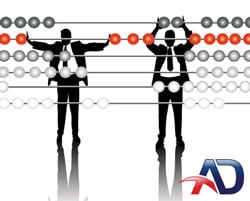 If your bookkeeping is like most other small business bookkeeping services, you use the cash method of accounting. You record transactions either when you receive a payment or when you pay an expense. Cash accounting is simple, and it provides a clear picture of your company’s cash flow. However, some companies prefer the accrual method even though it’s more complex.
If your bookkeeping is like most other small business bookkeeping services, you use the cash method of accounting. You record transactions either when you receive a payment or when you pay an expense. Cash accounting is simple, and it provides a clear picture of your company’s cash flow. However, some companies prefer the accrual method even though it’s more complex.
Accrual accounting differs from cash accounting because it doesn’t book transactions when payment changes hands. You don’t record payment when your customer pays an invoice; instead, you record payment on the day you complete the job. Also, you don’t log an expense when you write the check, but you log the expense on the day that you received the service. Your accounting services provider can help you evaluate whether cash or accrual is right for your business.
What Are the Advantages of Cash vs. Accrual Accounting?
Although the real comparison between cash and accrual is more complex, this list provides a simple summary of each method’s major advantages:
- Accrual accounting gives you a better picture of your company’s overall performance. Instead of tracking payments, you’re tracking how much work you do during a particular period, which gives you a better picture of the health of your business.
- Accrual accounting is more timely. If you complete a large job for a client in December and don’t receive payment until January, then you can still book the income in December even when you haven’t received payment. You can count your income in the current tax year instead of delaying it until the following tax year.
- Cash accounting requires less work. Cash accounting allows you to spend less effort on bookkeeping.
- Cash accounting helps you to see what you have at a glance. With cash accounting, you can see your cash flows all of the time, which helps you to quickly see how much cash your business is putting into the bank.
Tax Reform Could Force More Companies to Switch to Accrual
The IRS requires most companies that have inventory to use accrual accounting to record sales of merchandise. Once a business earns more than $10 million annually, it’s generally required to switch to accrual accounting.
This requirement may change, however, based on a tax reform bill that the House Ways and Means Committee is currently drafting. If Congress gets its way, more businesses may have to switch to accrual accounting in the future, which could significantly affect your small business tax bill. If your company is a partnership, an S-corporation, a personal services corporation or a farm operation, talk to an accounting services provider about how these changes might affect your company.
Need help figuring out what type of accounting you need? Our certified bookkeepers and accounting professionals can help. Schedule a free 30 minute consultation today.














